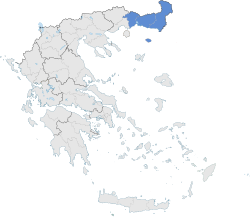
Back تراقيا الغربية Arabic Qərbi Frakiya Azerbaijani Заходняя Фракія Byelorussian Западна Тракия Bulgarian Západní Thrákie Czech Thrakien (geographische Region Griechenlands) German Θράκη (διαμέρισμα) Greek Tracia Occidental Spanish Traakia (Kreeka geograafiline piirkond) Estonian Mendebaldeko Trazia Basque
Thrace
Θράκη | |
|---|---|
 Thrace (blue) within Greece | |
| Cession | 1920 |
| Replaced as administrative region by Eastern Macedonia and Thrace | 1987 |
| Capital | Komotini |
| Regional units | |
| Government | |
| • Deputy Minister | Stavros Kalafatis (New Democracy) |
| Area | |
| • Total | 8,578 km2 (3,312 sq mi) |
| Population | |
| • Total | 371,208 (2011 census)[1] |
| • Density | 43/km2 (110/sq mi) |
| Demonym | Thracian |
| Largest City | |
| Website | www |
Western Thrace or West Thrace (Greek: [Δυτική] Θράκη, [Dytikí] Thráki [ˈθraci];) also known as Greek Thrace or Aegean Thrace, is a geographic and historical region of Greece, between the Nestos and Evros rivers in the northeast of the country; East Thrace, which lies east of the river Evros, forms the European part of Turkey, and the area to the north, in Bulgaria, is known as Northern Thrace.
Inhabited since paleolithic times, it has been under the political, cultural and linguistic influence of the Greek world since the classical era;[2][3] Greeks from the Aegean islands extensively colonized the region (especially the coastal part) and built prosperous cities such as Abdera (home of Democritus, the 5th-century B.C. philosopher who developed an atomic particle theory, and of Protagoras, a leading sophist) and Sale (near present-day Alexandroupolis).[2] Under the Byzantine Empire, Western Thrace benefited from its position close to the imperial heartland and became a center of medieval Greek commerce and culture; later, under the Ottoman Empire, a number of Muslims settled there, marking the birth of the Muslim minority of Greece.
Topographically, Thrace alternates between mountain-enclosed basins of varying size and deeply cut river valleys. It is divided into the three regional units (former prefectures): Xanthi, Rhodope and Evros, which together with the Macedonian regional units of Drama, Kavala and Thasos form the Region of East Macedonia and Thrace.
The Fourth Army Corps of the Hellenic Army has its headquarters in Xanthi; in recent years, the region has attracted international media attention after becoming a key entering point for illegal immigrants trying to enter European Union territory; Greek security forces, working together with Frontex, are also extensively deployed in the Greco-Turkish land border.
- ^ Cite error: The named reference
2011 censuswas invoked but never defined (see the help page). - ^ a b "Thrace - region, Europe". Encyclopedia Britannica.
- ^ Σαμσάρης, Δημήτριος Κ (14 January 1980). "Ο εξελληνισμός της Θράκης κατά την Ελληνική και Ρωμαϊκή αρχαιότητα". Archived from the original on 14 January 2019. Retrieved 14 January 2019 – via olympias.lib.uoi.gr.
{{cite journal}}: Cite journal requires|journal=(help)
© MMXXIII Rich X Search. We shall prevail. All rights reserved. Rich X Search